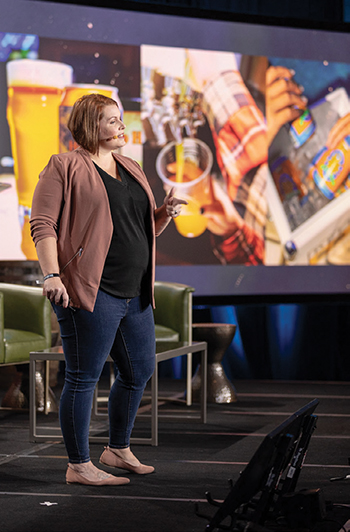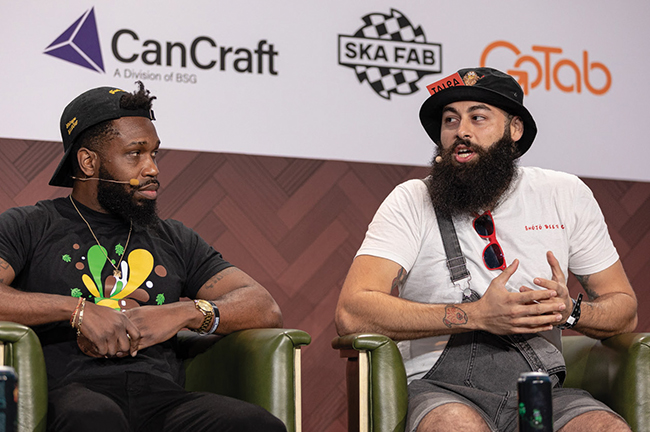Brewbound Live Focuses on Culture, Fortifying Businesses for the Road Ahead
With economic uncertainty on the horizon and an industry in flux amid convergence and consolidation, fortifying businesses and fostering people-first workplaces were among the focuses of the 2022 Brewbound Live business conference in December.
Bell’s Brewery EVP Carrie Yunker opened the event with a keynote speech on the opportunities and challenges created by people-focused businesses. One simple question — “What do you think?” — can unlock a new level of engagement with your workforce, Yunker said.
Yunker shared her nearly 20-year journey from receptionist to heir apparent to founder Larry Bell.
“I don’t come from an MBA program. I don’t come from the sales and marketing side of the business. I didn’t start or inherit the business,” she said. “I came from the people side of the business.”
The work of creating an inclusive business can be challenging, “hard” and “scary,” Yunker acknowledged, even for companies with dedicated resources. And “there is no finish line.” She encouraged leaders to set aside their fears, “be brave and willing to take action” and “commit to practice over perfection,” acknowledging that sometimes they’ll get it wrong.
Beyond being the right thing to do, leading with a people-first mindset is the best way to drive revenue and hit business targets, Yunker added. This type of work is noticed by consumers, who are as focused on who they buy from as what they are buying.
“People power your business, and your business will only thrive as your people thrive,” she said.
Schilling Cider CEO Colin Schilling bookended Day One with a talk stressing the importance of workplace culture in hiring and retaining employees. Toxic workplaces are more than 10 times more powerful of a factor in predicting employee turnover than any other factor, including compensation, Schilling said. As a result, companies must look at their workplace culture and determine what adjustments need to be made to improve and become more profitable.
Schilling Cider recently transitioned from a “strategy-driven” to a “people-first” organization, and while Schilling doesn’t consider himself a “culture expert,” the shift provided him with a “roadmap” that he shared with conference attendees. A key to that map is knowing that cultural change has to “be driven from the very top.”
“This is not a process that you can toss over to HR and say ‘Hey, let me know when this is done so I can come up and give a speech about it,’” Schilling said. “The CEO has to drive this conversation; the entire executive team has to be very aligned on this.”
Also important is distinguishing between culture and morale, he said.
“Culture is something that’s much more lasting and enduring,” Schilling added. “And it’s really one of those things that is harder to change.”
Standing Out Among 9,500 Breweries
With nearly 9,500 breweries operating in the U.S., the surest way to stand out is to have a strong and authentic brand identity.
Talea Beer Co. co-founder LeAnn Darland, Funkytown Brewery co-founder Rich Bloomfield and Shojo Beer Co. co-owner and head brewer Haidar Hachem shared how they’ve each created strong brand identities to fill the gaps for underrepresented groups in craft beer.
Hachem and his wife Marilyn Orozco launched Shojo Beer Co. in 2021 as a Japanese-inspired craft brewery with influences from the couple’s Lebanese and Nicaraguan heritages.
“The biggest thing that we try to accomplish is there’s the difference between appreciation or appropriation,” Hachem said. “Appreciation, you try to share a story and build cross-cultural connections with other people by broadening the general public’s knowledge of other heritages and cultures and all those things. Versus appropriation, where I’m taking everything that’s either Nicaraguan or Lebanese or Japanese and just like, ‘Hey, this is mine.’”
Darland and co-founder Tara Hankinson started Talea in Brooklyn, New York, to create a winery-style experience for craft beer that is approachable for new consumers.
“The physical space is key for us: It’s bringing our brand to life,” Darland said. “That’s on top of the liquid that we’re putting in the cans and the packaging design. It’s all a huge effort and strategy to speak authentically to non-beer bros.”
Funkytown Brewery, a Chicago-based Black-owned brewery, has focused heavily on establishing its local presence with community events and other engagement opportunities. The company seeks out consumer feedback on brand styles and flavors when creating its offerings, which include a variety of styles such as an Irish red ale, Belgian witbier and oatmeal milk stout.
“You have to show how it fits into their lifestyle,” Bloomfield said.
Adding to the Brand Family
Leaders guiding three of the beer category’s top brands — Firestone Walker’s 805, Constellation Brands’ Modelo and Sierra Nevada’s Little Thing — shared insights on building those brand families.
Firestone Walker has found success beyond its core brand with 805 blonde ale, the brewery’s best-selling offering in off-premise retailers. Despite not having nationwide distribution, 805 is the No. 12 best-selling craft brand in IRI tracked channels.
Since its 2012 launch, 805 has maintained a brand identity that is distinct from the Firestone Walker portfolio. The company launched a sister brand, Mexican-inspired lager 805 Cerveza, and while both 805s look and feel similar, they target different consumers.
“If you’re creating an incremental product, the idea is incremental customers,” Hinz said. “The last thing that we want to do is trade a Cerveza drinker into an 805 drinker.”
Meanwhile, Sierra Nevada’s Hazy Little Thing, which launched in 2018, has eclipsed flagship Sierra Nevada Pale Ale to become the third best-selling craft brand in IRI-tracked off-premise retailers. However, Hazy Little Thing proved to be “highly divisive,” even internally, Ingram said.
“It was not popular with a lot of folks inside our walls, because they felt like we were maybe chasing a fad or it wasn’t congruent with the traditional Sierra Nevada mold,” he said. “So, we felt like that was all the more reason to give it its own identity and pull it apart from what people have come to expect from Sierra Nevada. And I think that a large part of its success, frankly, is that it did stand out, it did stand alone.”
For the Modelo brand family, incremental growth has come from its Modelo Chelada line extension, which launched nearly 10 years ago and now includes several fruit-forward offerings in addition to its original traditional tomato-based offering.
“We really felt like we could come into that segment with a strong brand that brought really strong authentically Mexican credentials, deliver a really high-quality product in a new segment that was valuable and at the same time, strengthened back to our master brand,” Gallagher said.
Strengthening Wholesaler Partnerships, Decoding the Consumer
Forming a healthy relationship with a distributor is one of the most beneficial things a brewer can do to ensure long-term success, Scout Distribution CEO and co-founder Jeff Hansson and Reyes Beer Division VP of craft and innovation Jessica Muskey shared.
High on their list of things brewers can do? Get to know the distributor sales staff who will be in the market representing the brands.
“It’s great to have a relationship with me, but you need to have a relationship at the local level with our folks who are out there talking to our customers on a daily basis and selling – that’s where you need to get that focus,” Muskey said.
Hansson echoed the sentiment and encouraged suppliers to be “engaged with the team.”
“Go out and deck our drivers out with merchandise,” he said. “Anything to get share of mind with our people, first and foremost, especially mid-level management and down is so important, because it’s true; brands will call me and I’m like ‘Look, you can talk to me all day, but it’s the people that are gonna go get the wins for you and the placements in the trade, those are the people you got to talk to.’”
Nevertheless, understanding the modern consumer remains tricky. Mary Guiver, global principal category merchant for beer at Whole Foods, and Jamie Carawan, Buffalo Wild Wings’ VP of brand menu and culinary, noted the dichotomy between consumers seeking no- and low-alcohol options and those wanting higher ABV products.
Guiver noted that consumers are looking for sale tags, even as others are dropping $25 for 4-packs of local craft beer. Nevertheless, she cautioned bev-alc brands not to push price in 2023.
Carawan added that some Buffalo Wild Wings consumers are pulling back on the number of visits — making a decision between filling their gas tanks and dining out.
“If they were coming twice, they’re coming once a week,” he said. “If they were coming four times a month, they’re coming twice a month. And they’re really managing check right now. So we’re looking at how do we deliver value?”
Sunboy Wins 2022 Pitch Slam Competition
Hard coconut water maker Sunboy won the 14th edition of Brewbound’s Pitch Slam competition, presented by Ollie, a Next Glass company.
New York City-based Sunboy bested five other finalists — including High Seas Mead, Primary Colors Brewing, RationAle Brewing, Rincon Reservation Road Brewery and Shoal Draft Cider — to claim the top spot.
In a four-minute pitch, co-founder Yair Tygiel shared the story of his brand’s founding, which began with a custom method to brand coconuts for beverage companies for experiential marketing events in New York City prior to the COVID-19 pandemic.
“Sunboy hits on all of the biggest trends: ready-to-drink, better-for-you, lower sugar and lower alcohol,” Tygiel said. “We’re not allowed to make any explicit health claims, but we really don’t have to. Consumers understand that coconut water is hydrating, it’s healthy. It’s what they reach for in the morning when they’re feeling hungover.”
Sunboy, launched in 2021, is in more than 100 retail accounts in New York, including Whole Foods Market. Its products (5% ABV, 130 calories and 3 grams of sugar per 12 oz. can) are available in three flavors: passion fruit, tangerine, and pineapple.
“Choosing retail targets is easy for us,” Tygiel said. “One of our off-premise cheats is to target accounts that already sell a lot of coconut water. We know our customers are there, and it’s easy for us to sell a 4-pack of Sunboy for $10.99 when consumers are used to paying $6 for a single bottle of coconut water in the same store.”


Receive your free magazine!
Join thousands of other food and beverage professionals who utilize BevNET Magazine to stay up-to-date on current trends and news within the food and beverage world.
Receive your free copy of the magazine 6x per year in digital or print and utilize insights on consumer behavior, brand growth, category volume, and trend forecasting.
Subscribe
